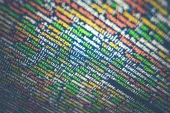Facial recognition tech: running ahead of the game
By Lawrence ChiaThe 2019 Standard Chartered Hong Kong Marathon saw a record number of participants take part in this annual race. After the event, social media feeds were flooded with posts from marathon-going friends and friends of friends; complete with high-quality photos from professional and amateur photographers.
In previous years, marathon participants would count on their friends to show up and take photos of them, or wait for the official race photos to come out and trawl through them looking for shots of themselves – a time-consuming process to say the least. Today, things are different. Photographers are everywhere, and sites selling professional photos of racers are proliferating. However, the problem of runners actually having to find photos of themselves still exists – but not for those using the Sportag site this year.
The site uses facial recognition technology to help athletes find photos of themselves quickly and efficiently. By uploading a recent photo of themselves and clicking the ‘find ME’ function, people can quickly find, and then through the site’s cloud storage and download services, purchase and print photos of themselves.
Of course, facial recognition technology has been making headlines for some time, mostly in terms of its application in the security and access control industries. In September 2018, Hong Kong International Airport officially launched e-security gates using facial recognition tech to validate access to restricted areas of the airport, and for passengers at a limited number of security checkpoints in Terminal 1. Biometric technology, including facial recognition, is also helping control access to personal devices – including mobile phones which use ‘Face ID’ to lock and unlock phones – residences, vehicles, offices and other premises. For complex, fast-paced environments like construction sites, kitchens and hospitals, facial detection access control is helping to keep sites secure and hygienic.
As the technology becomes more sophisticated and popular, we can see a much wider range of applications on the horizon: allowing medical records to be fetched in seconds, simplifying hotel check-in and check-out processes, making event access easier, and of course a vast array of possibilities for the world of marketing. Even now, facial expression detection technology allows the measurement of metrics like key emotions, whether or not people are paying attention and general consumer sentiment. As the tech advances, there will be incredible possibilities for personalised customer service and marketing messages tailored to individual customers – infinitely enhancing the physical shopping experience.
In Hong Kong in particular, the marketing possibilities are endless. Facial recognition has enormous potential for highly personalised retail marketing applications in Hong Kong – for instance, identifying an existing customer when they enter a shop and having an assistant bring them straight to ‘where they want to go’ will undoubtedly help boost sales. Similarly, identifying a new customer’s demographic – female or male, younger or older and so on – will help retailers direct customers to the right area of a shop, or introduce targeted products to them.
For all its positives though, facial recognition technology is being met in some quarters by resistance and scepticism – especially around the issue of personal data privacy. In light of several prominent data leaks, there is a prevailing climate of insecurity regarding personal information being hacked and stolen by unethical parties.
These are legitimate concerns, but at the same time, lawmakers are working hard to ensure privacy legislation keeps up with technology, whilst companies are mandated to do everything in their power to keep data safe and secure. Terms and conditions written for software and applications have lengthy data privacy clauses, as anyone who has invested the time in reading a terms and conditions agreement can tell you. Taking the marathon photo site as an example, a disclaimer states that any personal information collected will be used only for the site and identity information will not be shared with any third parties.
With the Sportag site using facial recognition technology to create real benefits for users, a case can be made that people are ‘willing to give up a little privacy for a lot of benefit’. Now that amendments to the Hong Kong Personal Data (Privacy) Ordinance are being considered, Hongkongers should be confident that as technology moves forward, their data will be safe with the companies that handle it. One thing is certain – as the benefits of facial recognition tech become more tangible and useful to the masses, it will become harder to resist and much easier to opt in.




















 Advertise
Advertise






